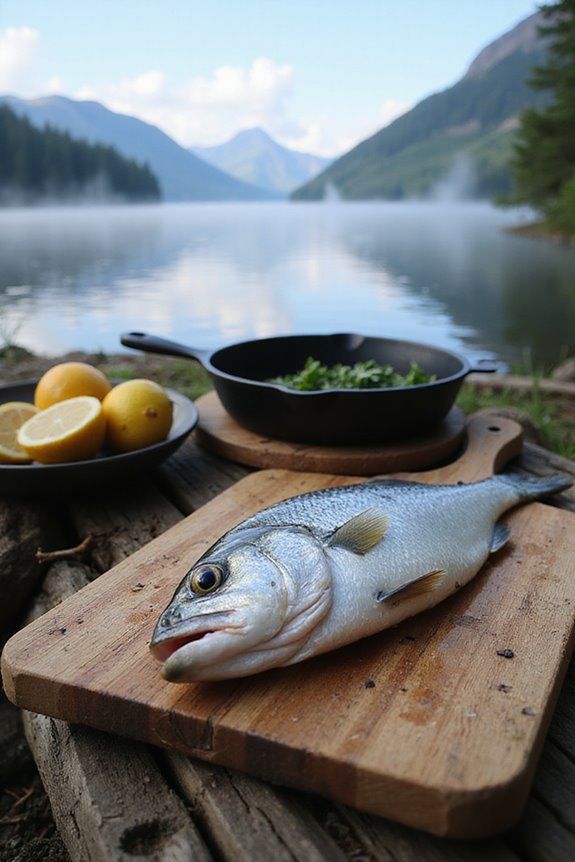To remove the fishy smell from fish, start by selecting fresh fish with clear eyes and firm flesh. Before cooking, marinate the fish in lemon juice or vinegar for 15-20 minutes. Clean the fish thoroughly by gutting, rinsing, and using coarse salt to scrub the skin. While cooking, consider steaming or poaching with flavorful broth. After cooking, boil a mix of water and vinegar to neutralize odors in your kitchen. For more detailed tips and techniques, further information is available.
Key Takeaways
- Use acidic ingredients like lemon juice or vinegar to soak fish for 15-20 minutes before cooking to eliminate fishy odors.
- Clean the fish thoroughly by gutting and rinsing it with cold water to remove blood and residue.
- Bake or poach fish in parchment paper or flavorful broth to contain and minimize odors during cooking.
- After cooking, boil a mixture of white vinegar and water to neutralize lingering fish smells in the kitchen.
- Open windows and use fans immediately after cooking to enhance air circulation and disperse fish scents quickly.
Selecting and Preparing Fish
Selecting and preparing fish is essential for guaranteeing the best flavor and freshness in your meals. When I choose fish, I look for freshness indicators like clear, bright eyes and shiny skin. The flesh should be firm and bounce back when pressed. I avoid fish with a strong odor, as that often means spoilage. For proper handling, I minimize the time between catch and refrigeration, storing fish on crushed ice or in a fridge below 4°C (39°F). I also make sure my utensils and surfaces are clean to prevent contamination. When purchasing, I check for intact skin and scales, steering clear of any discoloration. Using a quality fish scaler tool with serrated edges can significantly improve your fish preparation by efficiently removing scales while minimizing mess. By focusing on fish quality, I can guarantee my meals are delicious and fresh.
Utilizing Acidic Ingredients

When it comes to removing the fishy smell from your catch, utilizing acidic ingredients can be an effective method. I often use lemon juice, lime juice, or white vinegar for this purpose. Rubbing these acidic marinades directly onto the fish before cooking works wonders. For a more thorough approach, I soak the fish in a solution of lemon juice or diluted vinegar for about 15-20 minutes. The citric acid in lemon and lime neutralizes odor-causing amines, while vinegar tackles alkaline fish odors. Additionally, incorporating tomatoes into your dish adds mild acidity and flavor. For the best results, consider using a Pflueger President reel which provides excellent control when catching freshwater fish that typically have less fishy odor. Using these techniques not only aids in odor neutralization but also tenderizes the fish, enhancing its overall taste and freshness.
Effective Cleaning Methods Before Cooking

After using acidic ingredients to neutralize odors, it’s time to focus on cleaning the fish thoroughly before cooking. Start by gutting the fish properly; make a shallow cut from the anal opening to the head and remove the entrails completely. Rinse the cavity with a strong stream of cold water to eliminate blood and residue. For odor prevention, rub coarse salt on the skin and scrape off the dark tissue lining the abdominal cavity. Use a fish scaler to remove scales, rinsing again afterwards to eliminate debris. Maintain cleanliness by using fresh tools and washing your hands frequently. Finally, dry the fish after cleaning to minimize moisture, which can contribute to lingering fishy smells. Consider using a quality stainless steel dehooker when handling fish to minimize damage and help preserve freshness before cleaning.
Cooking Techniques to Contain Odor

To effectively contain fish odors during cooking, employing specific techniques can make a significant difference. I’ve found that using cooking methods like baking fish in parchment paper or foil traps odors, preventing them from spreading throughout the kitchen. Poaching fish in a flavorful broth or acidic liquid, like lemon juice, minimizes odor emission. For ideal odor containment, consider sous vide cooking, which seals the fish in vacuum bags. Steaming with aromatics, such as dill or garlic, also helps mask strong smells. Be mindful not to deep fry, as it generates stubborn odors. Additionally, placing vinegar nearby absorbs airborne fish odors, creating a more pleasant cooking environment. These strategies truly enhance my cooking experience while reducing unwanted smells.
Post-Cooking Odor Removal Strategies

While cooking fish can be a delightful experience, the lingering odors can be quite unpleasant. To tackle post-cooking smells, I recommend using odor absorption techniques. First, boil a mixture of white vinegar and water on the stove; the steam helps neutralize odors in the air. Placing bowls of white vinegar around the kitchen overnight also works wonders. For ventilation tips, open windows immediately after cooking. This allows fresh air to dilute any remaining fish smells. Using a fan can further enhance air circulation, drawing in outdoor air and exhausting the fish-scented air outside. Wiping down surfaces with lemon juice or vinegar after cooking minimizes residual smells, keeping my kitchen fresher for longer.
Additional Tips and Precautions
When you’re preparing fish, it’s essential to follow specific tips and precautions to guarantee safe handling and minimize odors. Always wash your hands thoroughly before and after handling raw fish. Use separate utensils and plates for raw and cooked fish to prevent cross-contamination, which can enhance unwanted smells. For safe storage, keep fish in the coldest part of your fridge or on ice, ensuring it stays below 40°F (4°C). If you have fish allergies in your household, label all foods clearly and prepare alternative dishes to avoid accidental exposure. Additionally, clean all surfaces and tools that come into contact with raw fish to eliminate residual odors. By taking these steps, you can enjoy fresh fish without overwhelming smells or health risks.
Frequently Asked Questions
Can Freezing Fish Reduce Its Fishy Smell?
Absolutely, I’ve found that using proper freezing techniques really helps with odor reduction. Quick freezing halts bacterial growth and enzymatic activity, keeping that fishy smell at bay when I thaw and cook my fish later.
What Types of Fish Have the Least Odor?
When I’m looking for mild fish, I often choose options like tilapia, halibut, or cod. These are mostly odorless options that make cooking enjoyable without that strong fish smell that can be off-putting.
How Long Can I Store Fish Before Cooking?
When storing fresh fish, I keep it in the fridge for 1 to 3 days, depending on the type. I always check for spoilage signs like odor or discoloration before cooking to guarantee it’s safe.
Does Cooking Fish in a Pressure Cooker Help With Odors?
I’ve found that using a pressure cooker doesn’t really help with fish odors. While it has benefits, I still prefer traditional odor reduction techniques like marinating or soaking before cooking to manage those smells effectively.
Are There Specific Herbs That Completely Mask Fish Odor?
When it comes to those lingering aromas from seafood, I’ve found that clever herb combinations like parsley and cilantro work wonders for odor absorption. They truly create a fragrant barrier, making everything more delightful!





